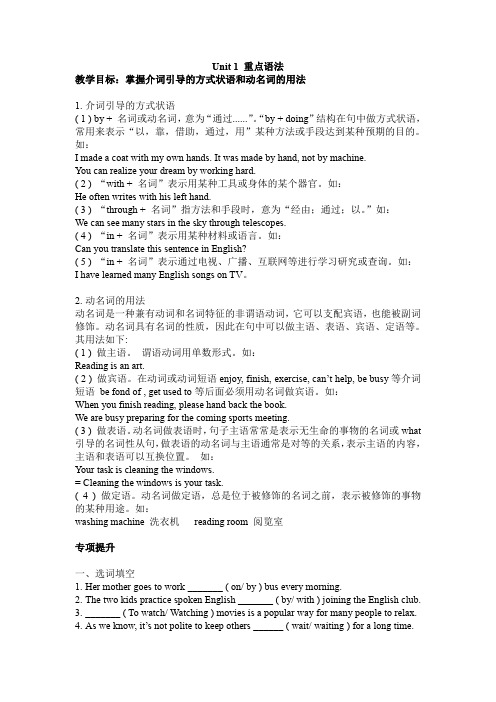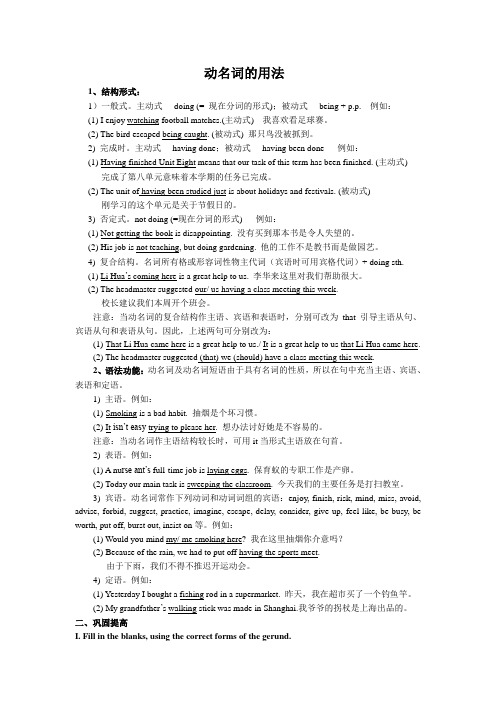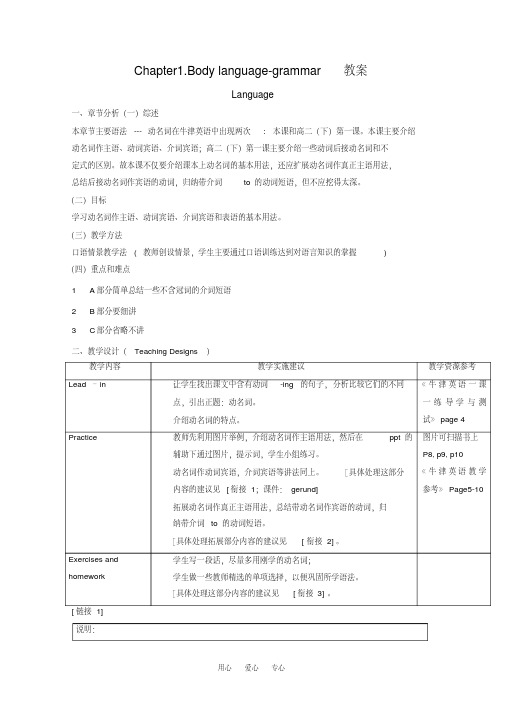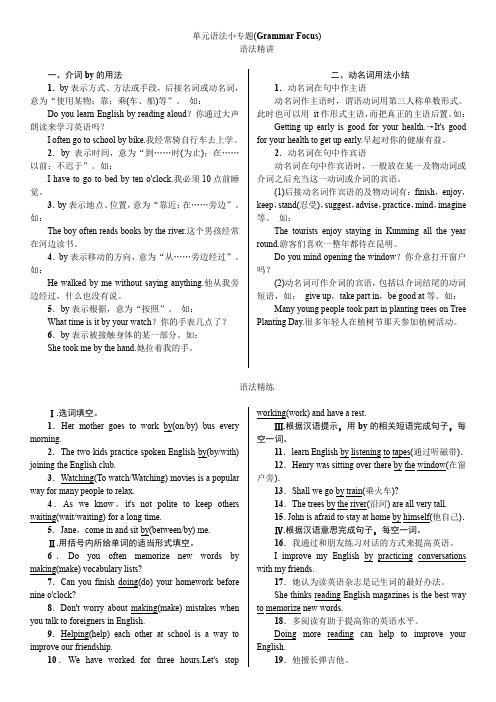unit1 动名词用法
人教版九年级上册英语Unit 1:Uni 1 重点语法

Unit 1 重点语法教学目标:掌握介词引导的方式状语和动名词的用法1.介词引导的方式状语( 1 ) by + 名词或动名词,意为“通过......”。
“by + doing”结构在句中做方式状语,常用来表示“以,靠,借助,通过,用”某种方法或手段达到某种预期的目的。
如:I made a coat with my own hands. It was made by hand, not by machine.You can realize your dream by working hard.( 2 ) “with + 名词”表示用某种工具或身体的某个器官。
如:He often writes with his left hand.( 3 ) “through + 名词”指方法和手段时,意为“经由;通过;以。
”如:We can see many stars in the sky through telescopes.( 4 ) “in + 名词”表示用某种材料或语言。
如:Can you translate this sentence in English?( 5 ) “in + 名词”表示通过电视、广播、互联网等进行学习研究或查询。
如:I have learned many English songs on TV。
2.动名词的用法动名词是一种兼有动词和名词特征的非谓语动词,它可以支配宾语,也能被副词修饰。
动名词具有名词的性质,因此在句中可以做主语、表语、宾语、定语等。
其用法如下:( 1 ) 做主语。
谓语动词用单数形式。
如:Reading is an art.( 2 ) 做宾语。
在动词或动词短语enjoy, finish, exercise, can’t help, be busy等介词短语be fond of , get used to等后面必须用动名词做宾语。
如:When you finish reading, please hand back the book.We are busy preparing for the coming sports meeting.( 3 ) 做表语。
九年级下笔记Unit1

九年级下笔记Unit11.children who watch too many TV commercials will care more about money and owning things. (P 看太多电视广告的孩子对钱和拥有东西都很在乎。
解析:(1) too many “太多”,后接可数名词复数形式;too much“太多”,后接不可数名词。
例如:There are too many people in the hall 提示:too much可作副词,放在动词后面修饰动词。
例如:Eating too much is easy to get fat. 吃太多很容易胖。
(2) owning是动名词,作介词about的宾语,即“ 介词+doing”。
2. So governments are now trying to do something to protect children. (P2) 所以政府正尽力为保护孩子做点事情。
解析:do something意为“做些事情,采取措施”,表示笼统的概念。
例如:We should do something to keep the children safe.3. It is illegal for them to work in factories. (P2)对他们(孩子们)来说,在工厂做工是违法的。
解析:illegal意为“违法的,非法的”,由前缀il-+legal构成。
il-表示否定意义,与某些词一起可以构成其反义词。
4. We should protect children from these commercials. (P2) 我们应该保护孩子们,抵挡这些广告。
解析:protect意为“保护”,常与介词from或against连用,构成句型:protect sb. / sth. from (doing) ...“保护某人/某物以免受到……的伤害”。
动名词的用法

动名词的用法1、结构形式:1)一般式。
主动式----doing (= 现在分词的形式);被动式----being + p.p. 例如:(1) I enjoy watching football matches.(主动式) 我喜欢看足球赛。
(2) The bird escaped being caught. (被动式) 那只鸟没被抓到。
2) 完成时。
主动式----having done;被动式----having been done 例如:(1) Having finished Unit Eight means that our task of this term has been finished. (主动式)完成了第八单元意味着本学期的任务已完成。
(2) The unit of having been studied just is about holidays and festivals. (被动式)刚学习的这个单元是关于节假日的。
3) 否定式。
not doing (=现在分词的形式) 例如:(1) Not getting the book is disappointing. 没有买到那本书是令人失望的。
(2) His job is not teaching, but doing gardening. 他的工作不是教书而是做园艺。
4) 复合结构。
名词所有格或形容词性物主代词(宾语时可用宾格代词)+ doing sth.(1) Li Hua’s coming here is a great help to us. 李华来这里对我们帮助很大。
(2) The headmaster suggested our/ us having a class meeting this week.校长建议我们本周开个班会。
注意:当动名词的复合结构作主语、宾语和表语时,分别可改为that引导主语从句、宾语从句和表语从句。
人教九年级英语上册-Unit 1 Review of Unit 1

13. Please make two ___se_n_t_e_n_c_e_s__ (句子) with these new words.
偿还;报答
付费;付出代价
还清(债务等);付清; 取得成功;报复;赢利
pay back pay for
pay off
down 的相关短语
下降
get/ go down
冷静下来
calm down
使失望
let... down
躺下
调低(音量等); 关小;拒绝
lie down turn down
即时演练
一、根据句意及汉语提示填写单词。 1. She had learned to ___in_c_r_e_a_s_e__(增加) working
D. look forward to
6. He practices ______ English every day in order to improve his ______ English. A. speaking; speaking B. spoken; spoken C. spoken; speaking D. speaking; spoken
3. Susan never gets upset when she has to wait in line. She is very ______. A. shy B. honest C. funny D. patient
4. Your spoken English is very good. What’s
高中英语unit1Bodylanguage-grammar教案牛津上海版S1A

Chapter1.Body language-grammar教案Language一、章节分析(一)综述本章节主要语法---动名词在牛津英语中出现两次: 本课和高二(下)第一课。
本课主要介绍动名词作主语、动词宾语、介词宾语;高二(下)第一课主要介绍一些动词后接动名词和不定式的区别。
故本课不仅要介绍课本上动名词的基本用法,还应扩展动名词作真正主语用法,总结后接动名词作宾语的动词,归纳带介词to的动词短语,但不应挖得太深。
(二)目标学习动名词作主语、动词宾语、介词宾语和表语的基本用法。
(三)教学方法口语情景教学法( 教师创设情景,学生主要通过口语训练达到对语言知识的掌握)(四)重点和难点1A部分简单总结一些不含冠词的介词短语2B部分要细讲3C部分省略不讲二、教学设计(Teaching Designs)教学内容教学实施建议教学资源参考Lead –in 让学生找出课文中含有动词-ing的句子,分析比较它们的不同点,引出正题:动名词。
介绍动名词的特点。
《牛津英语一课一练导学与测试》page 4Practice 教师先利用图片举例,介绍动名词作主语用法,然后在ppt的辅助下通过图片,提示词,学生小组练习。
动名词作动词宾语,介词宾语等讲法同上。
[具体处理这部分内容的建议见[衔接1;课件:gerund]拓展动名词作真正主语用法,总结带动名词作宾语的动词,归纳带介词to的动词短语。
[具体处理拓展部分内容的建议见[衔接2]。
图片可扫描书上P8, p9, p10《牛津英语教学参考》Page5-10Exercises and homework学生写一段话,尽量多用刚学的动名词;学生做一些教师精选的单项选择,以便巩固所学语法。
[具体处理这部分内容的建议见[衔接3]。
[链接1] 说明:这是一份关于动名词的基础教学的教案与课件。
Step One lead-in1Ask students to find the sentences which have the form of v.+ing in the text .(possible answers):He gave an encouraging smile.Communicating is more than speaking and listening.She is holding her head up.2Explain the meaning and features of gerunds.Gerunds are –ing nouns. It is a kind of nouns. So in the above sentences, only“communicating, speaking, and listening” are gerunds. As a noun, gerunds canbe used as subject, verb object, preposition object, predicative and attributive. Step Two Presentation1Gerunds as subjects1)Example:T: What does shaking hands mean?S1: Shaking hands is a sign of friendship.S2: Shaking hands means that you are friendly.(动名词作主语时,位于动词用单数)2)PracticeStudents practise according to the example. They work in pairs. S1 makesquestions using the pictures and turning the verbs in brackets into –ing nouns. S2 chooses answers from the box.Shaking your fist is a sign of anger.Sighing is a sign of sadness.Yawning means that you are sleepy.Closing your eyes means that you are thinking.Whistling means that you are happy.Scratching your head means that you are thinking.Bowing is a sign of respect.(补充讲解句型It is (was) no use/good doing something.)2Gerund as verb objects1)Example:T: I didn’t know you could swim.S: Didn’t you? I love/ like swimming.T: So do I. I really enjoy swimming.I don’t. I hate / dislike swimming.I prefer walking.2)Practice:Students work in pairs to make similar dialogues about the pictures. Followthe example.3)Tell students some other verbs which have such usages.admit, appreciate, avoid, be worth, complete, finish, deny, delay, postpone,escape, practice, suggest, miss, allow, permit, forbid, consider, imagine3Gerunds after prepositionsOn her first day at work, Debbie saw the things. She didn’t know what they werefor, so she asked Mr Yang.Work in pairs to complete their conversation. S2 should answer S1, using –ing nouns made from the verbs in the box along with “for”.1)Example:T: Excuse me, but what are these _keys_____ for?S: They’re _for____ __locking_____ the drawers of the desk.2)Practice:Students work in pairs to make similar dialogues about the pictures. Followthe example.S1: And this _______?S2: It’s _______ ________ letters.S1: What about these _______ ________?S2: They’re _______ ________ your paper together.S1: This ________. What’s it for?S2: It’s _______ _______ the dates on documents.S1: And these ________?S2: They’re _______ ________. They’re a present for your first day at work.( 补充总结含介词to的动词短语:be (get)used to, get down to, look forward to, lead to, pay attention to, be devoted to, object to例如:Let’s get down to talking about your future.I’m look forward to hearing from you.)(见课件:gerund)[链接2]说明:这是动名词的拓展部分,拓展了动名词句型、接动名词做宾语的一些动词、接动名1下列句型后用动名词1)It’s no use / good doing…2)There is no point (in) doing …3)It’s worth doing…4)…can’t help doing…〖典型例句〗1)It’s no use crying over the spilt milk.2)The place is well worth visiting again.3)There is no point cheating in the exam.4)We can’t help laughing at the joke.5)It’s no good copying others’ homework.2下列动词后常接动名词做宾语1)admit, appreciate, avoid2)complete, consider3)delay, deny4)endure/stand, enjoy, escape, excuse5)finish6)imagine7)keep8)mind, miss9)postpone, practice10)resist, risk11)suggest巧记这些动词的诀窍:继续坚持勿停止;盼望完成莫推迟错过成功会后悔;惯于冒险须放弃避免原谅不逃脱;忙于欣赏禁不住介意练习很值得;考虑建议末延迟想象无用已无益;记得做过勿忘记禁止使用不定式〖典型例句〗1)I enjoy reading books in bed though it is not a good habit.2)I can’t imagine going to any place without you.3)Would you mind opening the door for me?4)He suggests reading English every day.5)The bird missed being shot.6)He escaped being punished by running away.3下列动词短语种to为介词1)be (get)used to2)get down to3)look forward to4)pay attention to5)be devoted to6)object to7)lead to〖典型例句〗1)I used to get up late, bu t now I’m used to getting up early.2)After discussing with his deskmate, he got down to writing his composition.3)I’m looking forward to hearing from you.以下几点可以在以后单元里讲解:1)need/ want / require 句型2)love, like, hate 后接 to do 与doing 作宾语的区别3)stop, remember, regret, try, mean, go on, forget后接 to do 与doing 作宾语的区別4)allow, permit, consider, advise后接 to do 与doing 作宾语和宾补的区别5)动名词的时态和语态6)动名词的复合结构[链接3]说明:Ⅰ单选:1.Do keeping _____, will you?A. to tryB. tryC. having triedD. trying2. We are all looking forward ______ Mr. Smith next week.A. to seeB. of seeingC. at seeingD. to seeing3. He spent all his time ______ for the final examination.A. to prepareB. of preparingC. in preparingD. to preparing4. The boy is only five years old, but he is quite used _____ the telephone.A. to answerB. to answeringC. of answeringD. by answering5. ______soundly is better for your illness than taking medicine.A. To sleepB. SleepingC. SleepD. Having slept6. Sometimes when I look into the sky, I feel like ______ a trip somewhere.A. to makeB. makingC. makeD. to go for7. I consider _____ of every fish is a kind of murder.A. takingB. a takingC. the takingD. to take8. My grandfather is a rich man, but ______ money does not solve all his problems.A. hasB. to haveC. havingD. having had9. It is no good ______ him to see you off.A. to expectB. expectingC. of expectingD. for him to expect10.There is one more book worth ______.A. readB. of readingC. being readD. reading11.He liked ______ many questions at the press conference.A. being askedB. askingC. of askingD. ask12.We had no trouble ______ the path through the forest.A. to findB. for findingC. findingD. with findingII.用括号里的动词的正确形式填空:1. He insisted on _______(do )the work in some other way.2. The windows want / need / require to be cleaned. That is, they need / want / require_____ (clean).3. He practiced _______(play) the piano every day.4. She doesn’t mind ______( work ) overtime.5. It will mean ______( benefit ) your company and mine.6. Have you decided to put off ______( go ) to the seaside?7. Peter kept (on) ______ (ask) questions.8. It’s a waste of time ______( argue) about it.9. _____ ( talk ) is easier than doing.10. Have you finished _______ (do) your homework?III.翻译:1. ______(每天晨读一刻钟)is very important in learning English.2. It’s no use _______(叹气).3. Debbie enjoys _______(微笑着与客户交流).4. John has just given up ______(吸烟).5. I ______(一直盼望着访问)China again.6. He run off to avoid ______(看见)by his class teacher.7. This machine is for ______(切纸).8. This book is well worth ______(读).9. ______(挥动拳头)is a sign of anger.10. Mr. Yang suggested/advised ______ (看着顾客的眼睛)to make a good impression on him.IV.拓展题:1.---You were brave enough to raise objections at the meeting.---Well, now I regret _____that.A. to doB. to be doingC. to have doneD. having done2.The patient was warned _____ oily food after the operation.A. to eat notB. eating notC. not to eatD. not eating3.She looks forward every spring to _____ the flower-lined garden.A. visitB. paying a visitC. walk inD. walking in4.The little time we have together we try _____ wisely.A. spending itB. to spend itC. to spendD. spending that5.While shopping, people sometimes can’t help ______ into buying something they don’t really need.A. to persuadeB. persuading D. being persuaded D. be persuaded6.What worried the child most was ______ to visit his mother in the hospital.A. his not allowingB. his not being allowedC. his being not allowedD. having not been allowed7.Tony was very unhappy for _____ to the party.A. having not been invitedB. not having invitedC. having not invitedD. not having been invited8._____ to sunlight for too much t ime will do harm to one’s skin.A. ExposedB. Having exposedC. Being exposedD. After being exposed9.The discovery of new evidence led to _____.A. the thief having caughtB. catch the thiefC. the thief being caughtD. the thief to be caught10.One learns a language by making mistakes and _____ them.A. correctB. correctingC. correctsD. to correct11.---You should have thanked her before you left.---I meant _____, but when I was leaving I couldn’t find her anywhere.A. to doB. toC. doingD. doing12.In some parts of London, missing a bus means_____ for another hour.A. waitingB. to waitC. waitD. to be waiting13.---What’s made John so angry?---______ the tickets for the concert.A. LoseB. To loseC. Because of losingD. Losing14. The day we are looking forward to _______ at last.A. arrivingB. arriveC. arrived D. arrives15. Mr. Reed made up his mind to devote all he had to ____ some schools for poor children.A. set upB. setting upC. have set upD. having set up附答案:Ⅰ.单选:DDCBBBCCBDBCⅡ.用括号里的动词的正确形式填空:doing, cleaning, playing, working, benefiting,going, asking, arguing, Talking, doing Ⅲ.翻译:1.Reading for a quarter of an hour every morning2.sighingmunicating with customers with a smile4.smoking5.am looking forward to visiting6.being seen7.cutting up paper8.reading9.Shaking one’s fist10.looking at customers’ eyesⅣ.拓展题:DCDBD BDCCB BADCB。
人教版(河北专版)九年级英语上册练习 Unit 1 单元语法小专题

单元语法小专题(Grammar Focus)语法精讲一、介词by的用法1.by表示方式、方法或手段,后接名词或动名词,意为“使用某物;靠;乘(车、船)等”。
如:Do you learn English by reading aloud?你通过大声朗读来学习英语吗?I often go to school by bike.我经常骑自行车去上学。
2.by表示时间,意为“到……时(为止);在……以前;不迟于”。
如:I have to go to bed by ten o'clock.我必须10点前睡觉。
3.by表示地点、位置,意为“靠近;在……旁边”。
如:The boy often reads books by the river.这个男孩经常在河边读书。
4.by表示移动的方向,意为“从……旁边经过”。
如:He walked by me without saying anything.他从我旁边经过,什么也没有说。
5.by表示根据,意为“按照”。
如:What time is it by your watch?你的手表几点了?6.by表示被接触身体的某一部分。
如:She took me by the hand.她拉着我的手。
二、动名词用法小结1.动名词在句中作主语动名词作主语时,谓语动词用第三人称单数形式。
此时也可以用it作形式主语,而把真正的主语后置。
如:Getting up early is good for your health.→It's good for your health to get up early.早起对你的健康有益。
2.动名词在句中作宾语动名词在句中作宾语时,一般放在某一及物动词或介词之后充当这一动词或介词的宾语。
(1)后接动名词作宾语的及物动词有:finish,enjoy,keep,stand(忍受),suggest,advise,practice,mind,imagine 等。
牛津英语模块一Unit 1 重难点解析1
牛津英语模块一Unit 1 重难点解析1. What is your dream school like?你理想的学校是什么样的?理想学校:one’s dream school 或one’s ideal schoolbe like和look like的辨析:--- What is Tom like? 汤姆这人怎么样?--- What does Tom look like? 汤姆长得怎么样?--- He is kind and helpful. (内在本质)--- He is very handsome(英俊的).(外表长相)2. What did Wei Hua think of her life in the UK? 魏华认为她的英国生活怎么样?询问对方观点常用的表达有:What do you think of …? What do you find about…?How do you like….? What’s your opinion about…?3. Going to a British high school for one year was a very enjoyable and exciting experience for me.(1)动名词作主语是十分常见的语法现象。
但动名词既有主动形式:v-ing,也有被动形式:being done,要区别对待,灵活使用。
举例说明:Walking after meals is a good habit. 饭后散步是个好习惯。
Being praised by the class teacher made him very proud. 被班主任表扬让他很自豪。
(2)experience 可数名词时,表示“经历”,不可数时意思是“经验”。
experienced是形容词,意为“有经验的”。
He told us about his funny experiences in Africa. 他给我们讲述了在非洲时候的有趣经历。
八年级上册Unit1--Unit2重点短语,句子默写版
Unit1 Topic1 Section A语法:含有be going to +V原的一般将来时(P126)1.你将要去做什么?我将要去打篮球.2.喜欢做某事(经常性地)3.see的过去式saw看见某人经常做某事/做过了某事看见某人正在做某事,强调动作正在进行4.在暑假期间5.举办一场对抗3班的篮球赛against反对;倚着,靠着;撞到;映衬6.在星期天时间介词in, on, at 的用法:年月季节早晚in,at午夜时与分,具体某日上下午,星期日期全用on.7.我希望我们的队伍将会赢。
我也是.8.你愿意来为我们加油吗?当然,我愿意.为某人加油( sb是宾格, 因为跟在动词后)9. 你更喜欢哪一种运动,A or B ?prefer的用法:prefer + 名词= like +名词+ better如:I prefer apples = I like apples better prefer doing sth to doing sth 更喜欢做某事胜过做某事10.你划船多吗? 是的,非常多/ 不,很少。
(P2)11.你打算加入学校划船队吗?是的。
/不,我打算………(P2)13.区分:参加,加入(1)加入人或组织用:(2 ) 参加某项活动3个Unit1 Topic1 Section B1.你最喜欢什么运动?2.你最喜欢的运动员是谁?3.你知道关于他的一些事吗?4.他多高?他2.26米高。
(数词+名词+形容词)5.为…效力与…比赛和…玩6.我打算成为像他一样的篮球运动员。
7.那是我的梦想。
8.你长大后想当什么?我打算成为一名科学家。
(when引导时间状语从句,主将从现)What is he going to be when he grows up?9.在今后Unit1 Topic1 Section C1.非常喜欢2.骑自行车3.四“花费”①spend的两个词组(spend--spent)主语为人②pay for (pay--paid) 主语为人③cost (cost--cost)主语为物④take:It takes sb. some time to do sth. 主语为形式主语it4.爬山5.在体育馆6.擅长…7.学校运动会8.跳高9.跳远10.确信,确定(2个)①确定做某事be sure to do sth②对某事确定,有把握be sure of / about sth③be sure+that从句④be not sure+if / whether 从句11.There be句型的一般将来时结构:(there be中不能出现实义动词have)将有(2个)12.使某人/某物保持某种状态13.使某人做某事14.受…欢迎15.对什么有益反义词组16.全世界17.保持健康18.做某事的一个好方法19.她每天都在体育馆花费半小时锻炼。
Unit1 What’s the matter详解精讲
Unit1 What’s the matter?Section A1.talk about 谈论,后接谈论的话题,代词用宾格,动词用动名词形式。
talk to 和某人交谈,接人。
talk with 与某人交谈,接人,强调双方交谈。
你最好和他谈谈这件事(had better 最好事it)让我们谈论一下做饭吧(cook 动词)1. What’ s the matter? 怎么啦?出什么事情了?【解析】matter n.问题;事情用于询问某人有什么病或某人遇到什么麻烦、问题其后跟询问对象时,与介词with连用。
即:What’ s the matter with you?= What’s the trouble with you? = What’ s wrong with you? =What’s the problem with you?= What’s up? = What happens to sb.? 你怎么了?【注】:matter 和trouble 为名词,其前可加the 或形容词性物主代词,wrong 是adj. 不能加the, happen为动词(发生)—What’s the matter with you ? — I have a bad cold.【2013自贡3】18. —What’s the matter ______ Tom. He is wet through. —His car ran _______ the river. A.with; in B.to; into C.with; into( ) ①What’s ____ with you? A. trouble B. the matt er C. the wrong D. matter( )②— ______? — Nothing serious , but a bit tired. —Better have a rest now, dear.A. Is that allB. Is there anything elseC. What’s thisD. What’s the matter with you【2013湖北孝感】—_________? —I have a headache and I don’t feel lik e eating anything.A. How are youB. What can I do for youC. What’s the matter with youD. How do you like it【2011.云南昆明】27. —What’s the matter with Tina? —_______________.A. She is away.B. She is cool.C. She has a sore throat.D. She should take some medicine【拓展】matter的用法还可做动词,意思为―要紧,有关系‖,主要用于否定句、疑问句和条件句中。
Unit 1 词汇讲解+习题-2021-2022学年高中英语牛津译林版(2020)选择性必修第四册
M7 U1 词汇讲解+练习Part 1 单词拓展1.barely /ˈbeəli/ adv. 刚好;仅仅,勉强可能;几乎不;刚才拓展:当never, seldom, few, little, barely, hardly, scarcely, rarely, no, not 等含有否定意义的副词及其构成的短语放在句首,句子要用部分倒装,即把be动词/情态动词/助动词提至主语前面。
2.appointment /əˈpɔɪntmənt/ n. 约定,约会;任命,委任;职务拓展:appointment n.约会;预约;任命,委任→appoint vt.任命;委派;指定;约定→appointed adj.指定3.make one’s fortune 发财拓展:fortune n.大笔的钱,财富;运气→fortunate adj.幸运的→fortunately adv.幸运地→【反】misfortune n.不幸→unfortunate adj.不幸的;令人遗憾的→unfortunately adv.不幸地;令人遗憾地4.reliable /rɪˈlaɪəbl/ adj. 可信赖的,可依靠的;拓展:*rely vi. 依靠,依赖,信任,信赖→reliable adj. 可依靠的,可信赖的→【同】depend vi. 依靠,依赖,信任,信赖5.worthwhile /ˌwɜːθˈwaɪl/ adj. 值得花时间(或花钱、努力等),重要的,令人愉快的(2) 拓展:*worthy adj.配得上的→worth adj.值……→worthwhile adj.值得做的,值得花费时间/金钱的→【反】worthless adj. 没有价值的;没有用的练习:词条搭配意义和用法worthwhile It’s worthwhiledoing...It’s worthwhile to do...值得做……worth be worth+n.值得……,值……be worth doing“某事值得被做”,要用动名词的主动形式表示被动意义。
- 1、下载文档前请自行甄别文档内容的完整性,平台不提供额外的编辑、内容补充、找答案等附加服务。
- 2、"仅部分预览"的文档,不可在线预览部分如存在完整性等问题,可反馈申请退款(可完整预览的文档不适用该条件!)。
- 3、如文档侵犯您的权益,请联系客服反馈,我们会尽快为您处理(人工客服工作时间:9:00-18:30)。
意见不合 决定不做某事 互相谈话 太多… 太多 对某人严厉 把……视为挑战 视为挑战
从括号中选择适当的词汇完成句子。 从括号中选择适当的词汇完成句子。 1. He is very frustrated (frustrating, _________ frustrated) because he can’t speak French. 2. We think the most _________ exciting (exciting, excited) thing is the roller coaster. 3. How often do you _________ (practice, practice exercise) Japanese with your pen pal?
Listening __________( listen) to tapes will help you a lot.
A: Do you have any problems in learning English? B: Yes, I do. A: What’s the problem? B: _____________________________. A: _____________________________. B: Thank you . I’ll try it.
41 learn a lot/much 42 join an English club 43 keep a diary in English 45 write original sentences 46 practice conversations with sb 47 do well/OK 48 get mad at sb 49 the best way to learn English It’s one’s duty to do sth 56 end up doing sth change problems/troubles/difficulty into challenge
读课本 英语语法 觉的不同使某人沮丧 发现某事沮丧
说得很快 激动 看起来很激动 伤心地朝某人看 一场刺激的比赛 英语口语 把某事视为挑战 感动某人 被深深感动 被某人深深感动
31 have trouble/difficulty(in)doing sth 做某事有困难 32 look up the words in a dictionary 用字典查阅单词 34 study for a text 36 work with sb 35 listen to tapes listen to the teacher carefully 36 ask sb for help He is asking for help. ask sb to do sth tell sb about sth 37 improve my listening /speaking skills 为一次数学小测学习 与某人一起工作 听磁带 认真听课 寻求帮助 他正在求救 叫某人做某事 告诉某人某事
Then I started to watch English-language TV. It helped a lot. I think that doing lots of listening practice is one of the secrets of becoming a good language learner. Another thing that I found very difficult was English grammar. So I decided to take lots of grammar notes in every class. Then I started to write my own original sentences using the grammar I was learning. It’s amazing how much this helped. Now I an enjoying learning English and I got an A this term. My teacher is very impressed.
12 尽力做谋事 13 突然终止 14 制作使用抽认卡 15 制作词汇表 16 大声说 把CD放开大声 放开大声 17 练习发音 18 发音Leabharlann 确 19 详细的建议 20.背书 背书
12 try one’s best to do sth 13 break off 14 make/use flashcards 15 make a vocabulary list 16 read/speak aloud=read loudly play the CD too loud 17 practice the pronunciation 18 get the pronunciation right =pronounce right 19 specific advice/suggestions 20 memorize/recite the words/text
5. 和朋友一起进行对话一点帮助也没有.
Having conversations with friends was not helpful at all.
6.我认为朗读很有作用.
I think reading aloud is very helpful.
小结: 小结 动词不能做主语 不能做主语,如果动词做主语需要把动词变成动 不能做主语 名词,即把动词名词化----动名词 动名词. 动名词
3a
How I learned to learn English
Last year my English class was difficult for me. First of all, it wasn’t easy for me to understand the teacher when she talked to the class. To begin with, she spoke too quickly, and I couldn’t understand every word. Later on, I realized that it doesn’t matter if you don’t understand every word. Also I was afraid to speak in class, because I thought my classmates might laugh at me. I couldn’t always make complete sentences, either.
实现某事 造一个完整的句子 结束做某事 …的秘密 的秘密 成为一个优秀语言学 家的秘密是练习 在某人帮助下 帮助某人做某事 持续很长时间 首先 以…开始 开始
77 have disagreement 78 decide not to do 79 talk to each other 80 too much + n. much too + adj. 81 be strict with sb sth. 82 regard sth as a challenge
在某方面出错
1 make mistakes in sth 2 later on 随后 3 be afraid to do sth 害怕做某事 be afraid of sth/sb 害怕…… 害怕 4. laugh at sb 嘲笑某人 5 take notes=write down the 做笔记 notes 处理 6. deal with=do with 对……感到生气 感到生气 7.be angry with 时间) 过去、 ( 时间 ) 过去 、 消 8. go by 逝 9.Time goes by. 时间流逝
I find English interesting.
我发现教英语有趣 我发现教英语有趣.
I find teaching English interesting.
考考你 :
1. 熟记流行歌曲的歌词也有一点帮助.
Memorizing the words of pop songs also helped a little.
Teaching English is my job.
1.家庭作业很无聊.
Homework is boring.
2. 做家庭作业很无聊.
Doing homework is boring.
Find的用法 1. Sb + find +it+ 形容词 to do sth. 形容词+ I find it exciting to watch football match. 2. Sb+ find +sth +形容词
2. 学习语法是学习英语的很好的方法.
Studying grammar is a great way to learn English .
3. 观看英语电影是一个不错的办法.
Watching English movies isn’t a bad way.
4.参加英语俱乐部是提高英语的最好办法.
Joining the English club was the best way to improve English
Unit 1
How do you study for a test?
1.我的兴趣是篮球.
My hobby is basketball.
2. 我的兴趣是打篮球.
My hobby is playing basketball.
3.英语是我的工作.
English is my job.
4.教英语是我的工作.
21 read the textbook 22 English grammars 23 feel differently 24 frustrate sb = make sb frustrated find sth frustrating 25 speak quickly/fast 26 get/be excited look excited look at sb sadly an exciting match/game 27 spoken/oral English 29 regard sth as a challenge 30 impress sb be impressed be impressed deeply by sb
